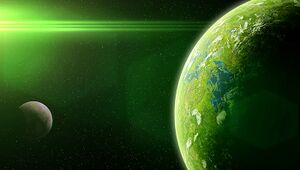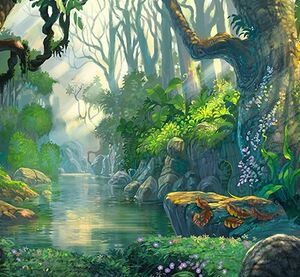Raana: Difference between revisions
ZinnoberTod (talk | contribs) No edit summary |
ZinnoberTod (talk | contribs) No edit summary |
||
| Line 1: | Line 1: | ||
'''RAANA''' | '''RAANA''' | ||
[[File:Haalu.jpg|thumb|left]] | |||
INFORMATION | INFORMATION | ||
Climate: Temperate tropical | Climate: Temperate tropical | ||
| Line 17: | Line 16: | ||
Age: 5.22 billion years | Age: 5.22 billion years | ||
'''HISTORY''' | |||
'''HISTORY''' [[File:Haalu2.jpg|thumb|right]] | |||
The Mahabharata probe discovered Raana already in 2116 after travelling through the newly recognized Celassi stargate. But it wasn't until 2120 that Earth sent the first scientific expedition to the thriving forest planet and began to map its surface. | The Mahabharata probe discovered Raana already in 2116 after travelling through the newly recognized Celassi stargate. But it wasn't until 2120 that Earth sent the first scientific expedition to the thriving forest planet and began to map its surface. | ||
Revision as of 07:51, 25 January 2022
RAANA

INFORMATION
Climate: Temperate tropical
Polar regions: No
Continental surface: 78%
Circumference: 42 500 km
Rotation speed: 23h, 12m
Age: 5.22 billion years
HISTORY

The Mahabharata probe discovered Raana already in 2116 after travelling through the newly recognized Celassi stargate. But it wasn't until 2120 that Earth sent the first scientific expedition to the thriving forest planet and began to map its surface.
The 2120 expedition found striking similarities to Earth. Not only was Raana highly suitable for maintaining life, the planet also shared a similar age and oxygen levels.
What was really convenient, however, was the planet's rotation speed. With minimal adjustments to the clocks on Raana, later colonists were able to synchronize their time with Earth's, even if a raanic hour was slightly shorter.